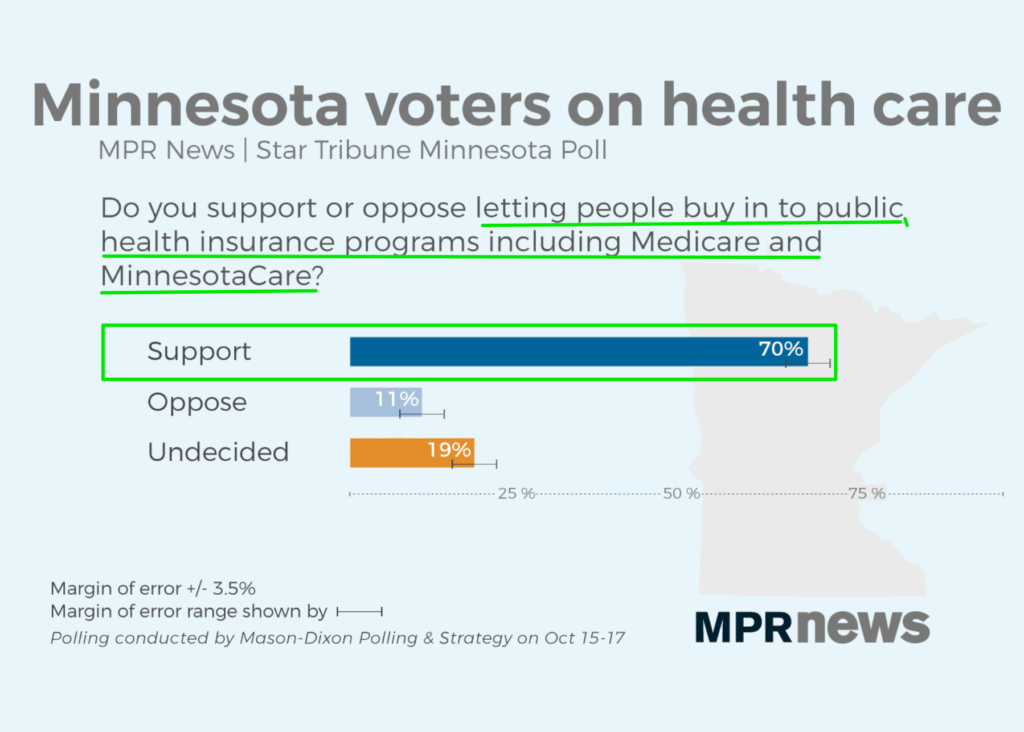Give leaders in the state of Washington a lot of credit. Governor Jay Inslee and the Washington Legislature recently passed legislation to create a public health insurance option that will save Washingtonians an estimated 5 percent to 10 percent compared to private health plans. Starting in 2021, the privately administered “CascadeCare” plan will be available to Washingtonians in the “individual market,” those under age 65 who can’t get insurance through their employers or another public insurance plan.

That’s significant progress, much more progress than Minnesota Governor Walz and the Minnesota Legislature made during the 2019 session when they failed to even seriously consider a plan to give Minnesotans in the individual market the option of buying into MinnesotaCare. President Trump and his followers are working overtime to sabotage and try to repeal popular Affordable Care Act (ACA) health protections, while Inslee is strengthening the ACA.
We need that kind of leadership in Minnesota. In the 2020 session, champions of the popular MinnesotaCare buy-in option should hold critics accountable for trying to block an initiative that could save consumers at least 10 percent of their health insurance costs.

The Fatal Flaw With Washington’s Law
I say “at least 10 percent,” because Washington leaders caved to medical lobbyists in order to get the law enacted. In the process, they sacrificed significant consumer cost-savings.
One of the primary reasons to give consumers a public option is because public health insurance programs with a huge pool of patients are in a relatively strong position to leverage lower medical costs. You know, like Medicare does. Here’s what a recent Urban Institute study found about Medicare’s ability to control medical costs.
“…average spending on private health insurance per enrollee grew 4.4% per year between 2006 and 2017—faster than the growth of spending per enrollee in Medicaid and Medicare, and faster than the growth of the gross domestic product per capita, which grew an average 2.4% each year.
Per-enrollee spending in Medicare grew an average 2.4% per year while per-enrollee spending in Medicaid grew 1.6% each year. Holahan said Medicare and Medicaid experienced slower spending growth than private insurance because public programs have more leverage over provider payment rates, helping them to keep costs down. Private payers end up paying higher hospital and physician prices.”
In the face of such findings, what do Washington leaders do? They guarantee reimbursements at a rate that is much higher than Medicare. The Seattle Times explains:
The (Washington) law will require health plans to reimburse medical providers and facilities at up to 160% of the federal Medicare rate. That is a higher rate than the original version of the bill, which capped the reimbursement at the Medicare rate.
CascadeCare champions had it right in their original bill. The reimbursement rate for the MinnesotaCare buy-in option should be set at the Medicare rate to allow savings to be passed on to Minnesotans. Washington leaders apparently were spooked by lobbyist threats that caregivers would deny care to patients if they got paid Medicare reimbursement rates.
Physicians Can’t Be Sacred Cows
We will never be able to significantly control health care costs until we demand savings from every part of the healthcare system — pharmaceuticals, medical devices, unnecessary procedures, administrative overhead, and, yes, caregiver reimbursements. American physicians, particularly specialists, are being paid more than physicians around the world, so controlling that cost-driver also must be in the mix. American doctors can no longer be treated like political sacred cows.
As long as lobbyist-cowed legislators keep carving out these kinds of special interest exceptions, medical inflation will continue to skyrocket and keep Americans from accessing health care. Minnesota legislators need to pass the MinnesotaCare buy-in option in 2020, and they should do it without caving to any of the interests driving medical costs making health care unaffordable and inaccessible for millions.
.

 As further proof that my cynicism knows no depths, let me assert that based on decades of experience, it is my belief that when it comes to personnel issues, by gargantuan enterprises like NBC/Comcast or merely big ones like Minnesota Public Radio …
As further proof that my cynicism knows no depths, let me assert that based on decades of experience, it is my belief that when it comes to personnel issues, by gargantuan enterprises like NBC/Comcast or merely big ones like Minnesota Public Radio … 


